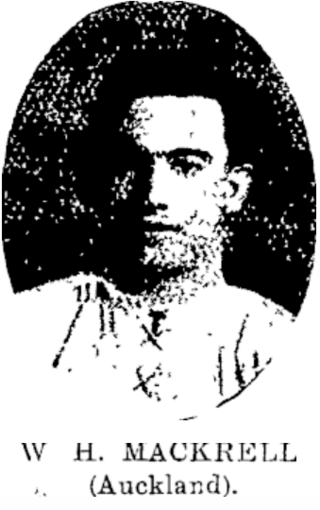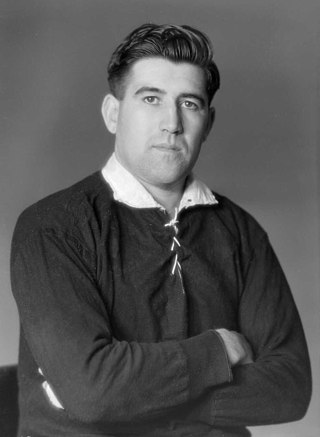Related Research Articles

The National Provincial Championship, often simply called the NPC, is an annual round-robin rugby union competition in men's domestic New Zealand rugby. First played during the 2006 season, it is the second highest level of competition in New Zealand alongside the Ranfurly Shield. It is organised by New Zealand Rugby (NZR) and since 2021, it has been known as the Bunnings NPC after its headline sponsor. A concurrent women's tournament is also held, the Farah Palmer Cup.

Waka Joseph Nathan was a New Zealand rugby union player who played rugby union for the New Zealand national team as a flanker. His feats on the field gained him the nickname "The Black Panther".

Keven Filipo Mealamu is a former New Zealand rugby union footballer. He played at hooker for the Blues in Super Rugby, Auckland in the National Provincial Championship, and the New Zealand national team. He was part of the Blues team that won the 2003 Super 12 title, the third for the franchise. He was a key member of 2011 and 2015 Rugby World Cup winning teams, becoming one of only 21 players who have won the Rugby World Cup on multiple occasions.

The Otago Rugby Football Union is the official governing body of rugby union for the Otago region of New Zealand. The union is based in the city of Dunedin, and its home ground is Forsyth Barr Stadium. The top representative team competes in the ITM Cup, New Zealand's top provincial competition. The union was to have been liquidated in March 2012. However a deal involving the Dunedin City Council allowed it to keep operating. Otago have won the Ranfurly Shield on seven occasions. They were the National provincial championship winners in 1991 and 1998. They have a proud record playing international teams, having defeated South Africa and the British and Irish Lions.

The Manawatu Rugby Football Union (MRU) serves as the governing body of the sport of rugby union in the Manawatū-Whanganui region of New Zealand.
Taranaki Rugby, previously the Taranaki Rugby Football Union, is the governing body for rugby union in Taranaki, New Zealand; Taranaki is a region of New Zealand that covers areas in the districts of New Plymouth and South Taranaki. Established in 1889, they represent the Mitre 10 Cup side, Taranaki Bulls, and Farah Palmer Cup side, Taranaki Whio. It is also affiliated with the Chiefs Super Rugby franchise. Their home playing colours are amber and black and they play their home games at TET Stadium & Events Centre in Inglewood.

Sir Frederick Richard Allen was a captain and coach of the All Blacks, New Zealand's national rugby union team. The All Blacks won all 14 of the test matches they played under his coaching.

Kelvin Robin Tremain was a New Zealand rugby union player and administrator. A flanker, he won 38 full caps for the New Zealand national team, the All Blacks, between 1959 and 1968, scoring nine tries. During the 1960s he had a status in New Zealand rugby comparable to that of his teammate, Colin Meads.
Dylan Gabriel Mika was a New Zealand-born rugby union player who represented the national teams of both Samoa and New Zealand.

Vincent David Bevan was a New Zealand rugby union player.
Frano Michael Botica is a New Zealand-Croatian rugby union and rugby league coach and former player in both codes, who played in the 1980s and 1990s. He is the head coach of the Philippines sevens team.

William Henry Clifton Mackrell was a New Zealand rugby footballer who represented New Zealand in both rugby union and rugby league. He was part of the 1905 The Original All Blacks tour and the professional 1907-1908 New Zealand rugby tour of Great Britain.
Gary John Braid is a New Zealand former rugby footballer who represented his country in rugby union. His two sons, Luke and Daniel, both play rugby union

John Burns Smith was a New Zealand rugby union player, soldier, sportsman and baker. He was an All Black captain, and despite only playing nine matches is recognised as a great. His 26 appearances for the Second New Zealand Expeditionary Force rugby team, which toured the UK in 1946–47, earned him high praise. He also played for the New Zealand Māori, being of Ngāpuhi descent.
Luke Charles Whitelock is a New Zealand rugby union player who currently plays as a loose forward for Section Paloise (Pau) in France's Top 14 rugby competition.

Koinonia Halafungani Laumape is a New Zealand rugby union footballer who currently plays as a centre for Kobelco Kobe Steelers. Laumape previously played in Super Rugby for the Hurricanes and was previously a rugby league player for the New Zealand Warriors in the National Rugby League.

Akira Ioane is a New Zealand rugby union player. Ioane plays blindside flanker and number 8 for the Auckland rugby union team in the Mitre 10 Cup, for the Blues in the Super Rugby competition and was selected for the All Blacks in 2017, having previously represented New Zealand internationally in Sevens and the Māori All Blacks.

Vaea Tangitau Lapota Fifita is a Tongan professional rugby union player who plays as a flanker for United Rugby Championship club Scarlets and the Tonga national team.

George Crispin Bridge is a New Zealand rugby union player who currently plays as an outside back for Montpellier Hérault Rugby in France's domestic TOP 14. Bridge made his international debut for New Zealand in 2018, aged 23.

Rieko Edward Ioane is a New Zealand professional rugby union footballer who plays as a wing or as a centre for New Zealand team Blues in Super Rugby and the New Zealand national team. In his youth career, he was selected to play in the 2014 and 2015 Sevens World Series for New Zealand and took part in Auckland Grammar School first XV, the top representative team in secondary school.
References
- 1 2 3 4 5 Knight, Lindsay. "Pat Crowley #487". New Zealand Rugby Museum. Retrieved 29 June 2018.
- ↑ English, Tom (5 May 2013). "Gus Black recalls his 1950 Lions experience". The Scotsman. Retrieved 29 June 2018.
- ↑ France, Marvin (14 August 2018). "WWE rising star Dakota Kai blazing a trail for Kiwi women wrestlers". stuff.co.nz. Stuff. Retrieved 17 August 2018.